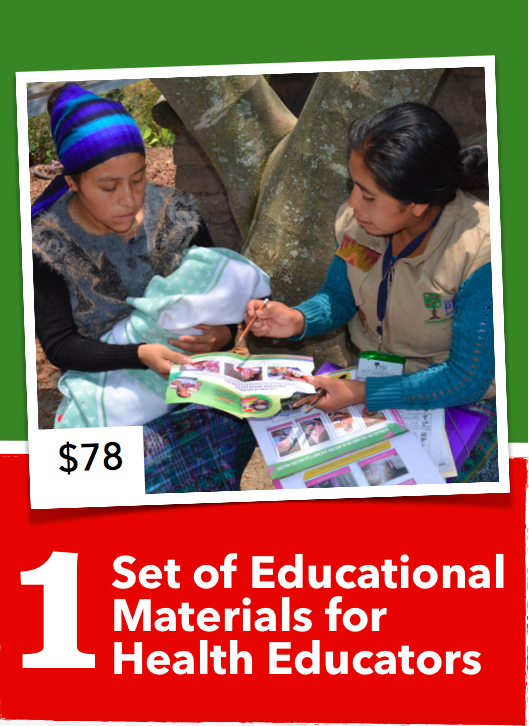Twelve Days of Giving
This Holiday Season give the gift of life to mothers and children in Totonicapán, Guatemala during Horizons of Friendship’s (Horizons) Twelve Days of Giving!
All proceeds to the Twelve Days of Giving will support Horizons' four-year “Maternal, Newborn and Child Health: Transforming Indigenous Lives” (MNCH) project saving the lives of Indigenous Maya K’iche’ mothers and children in Totonicapán, Guatemala.
Supporters can choose to donate on one or multiple days of the campaign, with each day featuring one of twelve essential resources needed for the project. These essential resources which are vital to improving healthcare for Indigenous mothers and children include:
· Medical equipment and medication
· Education and training for traditional midwives
· Nutritional supplements for children
and many more items.
TODAY IS DAY TWELVE OF GIVING!
Your donation will help provide the one year salary for a Health Educator with the Maternal, Newborn and Child Health Project. These Health Educators travel to remote and rural Indigenous communities to teach and provide resources on maternal and child health. In the first 18-months of the project they have visited over 9,000 women and their families!
ALL OF THE TWELVE DAYS OF GIVING:
These educational materials include printed pamphlets and rotafolios offered in both Spanish and Maya K'iche' as well as including picture diagrams that allow PIES Health Educators to inform and explain to pregnant women, mothers and family members maternal, newborn and child health best practices including: breastfeeding, nutrition, and many other themes. These educational materials are essential to informing the population to help prevent maternal and child deaths.
Your donation today can help support the MNCH project's Health Awareness Raising Campaign that provides messages to the public via radio on maternal and child health. These messages include information on: pregnancy, birth and postnatal care, breastfeeding and the care of infants, cervical and breast cancer, and many more. These radio messages are broadcast in both Spanish and Maya K'iche languages in order to reach the whole population of Totonicapán, which includes a large number of members who only speak their Indigenous Maya language.
Health posts are often the most accessible public health services for Indigenous Maya K’iche’ families in Totonicapán, Guatemala. Having proper equipment on hand helps these posts better serve mothers and children. Blood pressure monitors are essential equipment for healthcare providers to identify high blood pressure, a warning sign of a high-risk pregnancy. Early detection of warning signs ensures healthcare providers can respond to their patient’s needs before they become an emergency.
Despite new technologies, the traditional stethoscope continues to be an essential tool for assessing health. And for health posts in rural Guatemala, they can be a lifesaving instrument for identifying early warning signs of a high risk pregnancy.
Health educators provide health workshops in rural and remote communities for pregnant women, new mothers and their male partners. They receive much needed information on health and wellness in workshops conducted in Maya K’iche’ spoken by the vast majority of Totonicapán’s residents.
Previously unavailable, health education is changing lives in classrooms across Totonicapán, Guatemala. These health classes will provide a look at health topics including self-esteem and respect for oneself, physical and emotional development during puberty, understanding gender and gender equality and many more themes.
These manuals will assist communities as they make set protocols in case of a medical emergency: where to go, how to go and with whom. These steps are critical for ensuring mothers and children receive the community support they need in case of a medical crisis.
Today your donation to the Maternal, Newborn and Child Health project in Totonicapán, Guatemala will help provide much needed nutritional supplements to children. Eight out of ten Indigenous children throughout Guatemala suffer from chronic malnutrition.
Providing better nutrition and health care are two of the central aims of the Maternal, Newborn and Child Health (MNCH) Project . Today your donation will help provide life-saving antibiotics for Indigenous Maya-K'iche' children to help treat pneumonia.
Traditional Indigenous Midwives attend 69% of all births in Totonicapán, Guatemala. That’s why the MNCH project is providing them training workshops in maternal and child care best practices so they can update their skills to provide better and safer care for mothers and children.
Education is a key part in improving the health of Indigenous Maya K’iche’ mothers and children through the Maternal, Newborn and Child Health (MNCH) project in Totonicapán, Guatemala. Today your donation can help provide pamphlets on exclusive breastfeeding for pregnant women and new mothers. These pamphlets explain how exclusive breastfeeding is important for newborns so they can receive vitamins and protection from illnesses from their mothers.
Horizons embarked on its four-year MNCH project with its Guatemalan partner local PIES (Association for Health Promotion, Research and Education) in 2016 to help reduce high rates of maternal and child mortality in Totonicapán, Guatemala.
Currently 280 out of 100,000 Indigenous women in Totonicapán, Guatemala will die due to pregnancy complications. That’s 35x more likely than women in Canada.
Additionally, eight out of ten Indigenous children and infants suffer from chronic malnutrition contributing to high rates of mortality amongst this age group as well as stunted growth.
So far Horizons’ MNCH project has benefitted more than 70,000 Indigenous women, children and families and aims to reach over 200,000 by its conclusion in 2020.
The $13.2 million project is co-sponsored by Global Affairs Canada, who fund 85% of the project’s budget of which Horizons must fundraise the remaining 15%. This means Global Affairs Canada will provide a 6:1 match for every $1 received by Horizons - for every $1 you donate to this project, Global Affairs Canada will match with $6!
You can save the lives of Indigenous Maya K’iche mothers and children by supporting Horizons’ MNCH project during the Twelve Days of Giving.
To learn more about the MNCH project follow this link: https://www.horizons.ca/project-guatemala-mayan-textile-art-of-the-indigenous-women
















